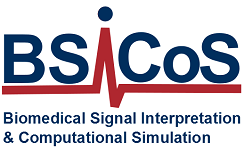-
Projects
Noninvasive assessment of autonomic nervous system through the analysis of biosignals variability. Application to stress-related clinical problem
Start date
2015
End date
2017
Coordinator
Raquel Bailón, Eduardo Gil
Funding agency
MINECO, TIN2014-53567-R
Dysfunctions of the autonomic nervous system (ANS) have been associated with a variety of diseases including hypertension, heart failure, obesity, diabetes, sleep apnea and mental disorders, which are among the most prevalent diseases in Spain and in Europe, mainly in elderly people. Stress, which is mediated by ANS, has been related to worsen or negative outcome of most of those diseases, as well as of physiological performances. Assessment of ANS is a challenging and potential tool in the monitoring and evaluation of the former applications. Since ANS activity prints characteristic patterns in cardiovascular signals, noninvasive measurement and interpretation of ANS activity through the processing of such signals has been proposed. In this project we aim at monitoring ANS response in stress-related clinical situations through the analysis of biological signals variability in order to decide best (personalized) treatment in pathological situations and the best planning in physiological situations. Clinical applications addressed in this project include physiological, pathological and psychological stress and are the following: – Identification of pregnant women at high risk of suffering hypotension during spinal anesthesia for cesarean delivery, which can benefit from prophylaxis, minimizing prophylaxis negative effects on fetuses. – Evaluation of obstructive sleep apnea impact on autonomic balance, related to cardiovascular risk, as well as the effectiveness of the treatment in risk reduction. – Prediction of hypotension during hemodialysis to improve treatment effectiveness in end-stage renal failure patients. – Determination of the relationship between ANS alterations, stress and the severity of two major diseases: depression and asthma. – Deriving fitness information from the ANS response to exercise-induced stress which can be used to evaluate and improve training programs. – Evaluation of the clinical value of heart rate variability (HRV) during exercise-induced stress in the diagnosis of coronary artery disease and in the prognosis of cardiovascular and all-cause mortality. To achieve the former objectives it is essential to develop techniques for the robust analysis of biological signals recorded in these stressrelated situations, mainly HRV and pulse photoplethysmograpic signals, as well for the physiologically-driven interpretation of the results. This requires the joint and tight collaboration of technicians and clinicians, addressed by our multidisciplinary research team. The research and work teams include members from national and international hospitals and universities, with proven expertise in their respective fields. The project will contribute to the research and development of technology for obtaining personalized treatment, therapy effectiveness evaluation, and identification of risk population, which will considerably reduce Health System costs. The participation of hospitals and companies interested in the project guarantees the potential application or transfer of the expected results. Results will have a high social impact as they will improve the outcome of highly prevalent diseases, being aligned with the societal challenge Health, Demographic Change and Wellbeing of Horizon 2020.
